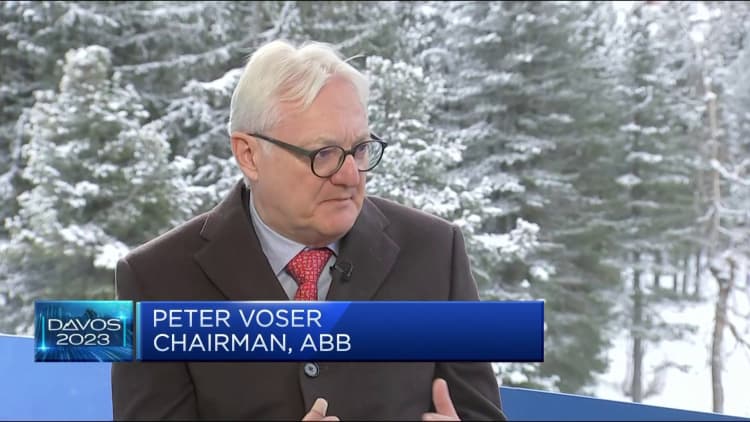
The global shortage of semiconductors is "being sorted out" after years of disruptions to supply chains that made them a scarce resource, according to the chairman of Swedish-Swiss tech and engineering giant ABB.
Asked whether supply chain issues with regard to semiconductors have been resolved, ABB's Peter Voser said that he believes the worst of the chip supply crunch has subsided.
"It was really an issue in 2022, specifically the first two, three quarters," Voser told CNBC at the World Economic Forum in Davos, Switzerland, on Monday.
"This was a real shortage on semiconductors, which affected us a lot because clearly when you're in electrification automation and robotics, one of the key components is semiconductors, and we are using quite complex ones, so therefore Taiwan is very important but also Chinese semiconductors," he added.
"But if I look today at it, I think it's now being sorted out. I think global growth slowdown has helped on this as well, and now for the future I'm quite optimistic."
Chips are the brains of electronic devices and can be found in a range of products from cars to home appliances to smartphones. They're a core piece of much economic activity, so the limitations in supply have had a ripple effect on the broader economy.
2022 was deeply challenging for ABB, Voser said, with the coronavirus in China and its related disruptions to global trade hitting the company hard. During pandemic-related shutdowns, ABB was forced to close factories in China, while hundreds of employees had to live in factories due to strict curbs on public life, he added.
"We still delivered in that sense but not at the full capacity," he said. "We weathered the storms in a certain way."
In 2023, however, Voser expects an improving outlook in China while the rest of the world experiences lower growth.
"Now with the latest wave of Covid, I think that's a different wave of Covid and dealing with the pandemic as we all know, I would guess that in a few months, this is over and [we are] getting into a more normal environment in China as well," Voser said.
"The rest of the world will see lower growth in 2023, I would predict, the first few months," he said. "In that sense, I am of the school [that in] the second half, China will bounce back and see growth which is higher than anticipated."
In the semiconductor space, slowing economic activity has helped balance out the shortage as a rise in the cost of living resulted in a softening of demand from consumers for pricey chip-equipped goods, according to Voser.
"I think with the global CHIPS act in U.S., investments in Europe, we will see more. Most probably, we are going into a capacity overhang pretty soon if the economy grows slower than anticipated," the ABB chairman said.
One thing the chip shortage has highlighted is the dependency of manufacturers on components from East Asia. TSMC, the Taiwanese semiconductor giant, is by far the largest producer of microchips.
Its chipmaking prowess is the envy of many developed Western nations, which are taking measures to boost domestic production of chips.
In the U.S., President Joe Biden last signed into law the CHIPS and Science Act, allocating billions to lure manufacturers to produce the widely used chips domestically. It has also sought foreign investments, convincing TSMC to spend $40 billion to produce more of its chips in the United States at two chip plants in Arizona.
Voser added, however, that brewing tensions between China and Taiwan were a risk to watch moving forward.
"It's a risk, I do not worry normally, I think it's a risk you have to manage," Voser said. "Having new sources of semiconductors across the world is very important, so you go from one supply source, Taiwan and then China into multiple sources and that's where some of the investments are really critical."






